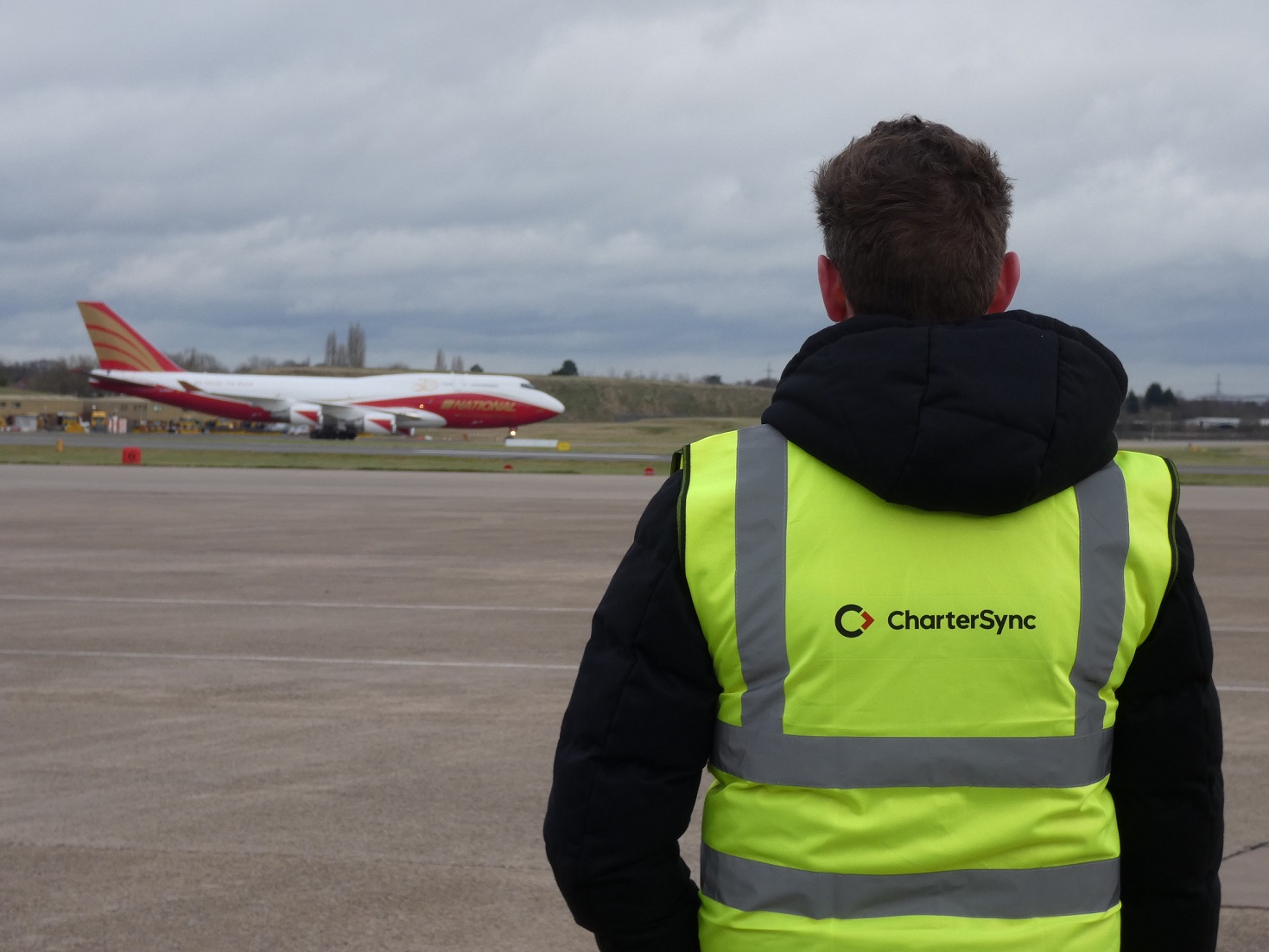Why technology rules for CharterSync
04 / 11 / 2022

Simon Watson. Source: CharterSync
Technology innovation has helped one young digital air cargo charter company not only survive but thrive.
Launched to give freight forwarders more, and faster charter options just over three years ago, CharterSync has rapidly evolved but smart technology remains at the core of its culture.
As CharterSync director and co-founder Simon Watson explains: “Our biggest challenge is making sure that we invest into our technology because it is our USP (unique selling point).”
The digital air cargo charter booking platform, which combines aircraft tracking technology with aircraft performance algorithms, aims to offer customers both transparency and efficiency and it is these qualities that the company has harnessed to help it grow.
The backgrounds of Watson and Gillett also weigh heavily on the culture of the company.
Both come from aviation backgrounds and their passion for the sector has been woven into the fabric of the company.
Having met in 2013 when they were training to be pilots with Easyjet on the airline’s cadet training programme, Watson and Gillett were inspired to found the company following a discussion on how a digital platform could make booking charters quicker and more efficient.
“The traditional charter broker process sounded quite out of date, or at least ripe for disruption,” says Watson.
Gillett brought to the table his experience as a charter broker for Air Charter Service and senior first officer, plus a degree in air transport management, while Watson had a physics degree with experience of running a commercial business and as a first officer.
The business was launched in June 2019 at Air Cargo Europe in Munich and started trading in July that year with a focus on the automotive just-in-time market.
“Our first business was carried out with three different time critical customers in Europe,” says Watson.
“They were freight forwarders working on behalf of car OEM manufacturers who wanted to get parts from A to B as quickly as possible.”
Since then, the Croydon-based business has gone from strength to strength. It published its accounts for the year ending December 2021 in September.
“From a trading level perspective year on year we are about doubling our turnover, as well as our gross profit and net profit, says Watson. “We’ve been profitable from the very start which is very fortunate.”
Expectations for the year ending December 2022 remain positive. “We’re forecasting revenues of £35m, and a seven-figure gross profit/net profit.”
The disruption in supply chains caused by Brexit, the pandemic and macro-economic factors that led to increase demand for cargo charters has served the company well.
It also helps that the company has a unique business advantage within the charter segment.
“We are the only charter company globally that is both digitising the way in which freight forwarders are working and also how carriers manage their cargo charter operation.”
Although this also comes with challenges. “Because we are pioneering and the first to market, you get a lot of headwind as well. There is a lot to learn,” reflects Watson.
Staff investment
The rise in charter demand during the pandemic has also seen CharterSync contending with more competition, albeit fragmented.
Aside from established traditional brokerages there are a lot of small businesses now operating, says Watson.
CharterSync has been tackling this by investing in growing its staff courtesy of its better than forecast performance.
“We’ve been able to hire in a number of senior people, to bring experience to the technology,” says Watson.
“Like anything in business, half of it is about timing, and the other half is making sure that you’re calculated in what you do with your hires.
“Because we’re building technology in-house, we feed staff experience into our technology so that it’s fit for purpose.”
CharterSync now has a team of 16 people overall, including a management team to work alongside Watson and Gillett.
Operations manager Tom Masey was the first to be hired into the business in February 2019, before the business even launched.
Andrew Burvill joined in September 2019 as operations coordinator before being appointed product & customer success manager in February.
In June, Mark Walls became chief product owner, heading up the product strategy and roadmap.
This allowed Watson to step back from day-to-day management of this area, although he still has oversight of the product development strategy.
Chris Metters also joined in a consultant advisory role to the board as interim financial director; and Hilary Blackburn was appointed risk management and compliance consultant.
Then in September, Daniel Carriett joined as global cargo director, with 22 years of experience in senior management in the UK air cargo charter broking industry.
The importance of having a robust team is clear. “It allows myself and Ed to take one step back from the day-to-day operations and adopt a more holistic helicopter type view of the business to better guide it.”

Source: CharterSync
Another recent hiring decision signals an exciting development for the company’s technology. CharterSync currently works with external technology developers but over the next year or so it will be bringing that development resource in-house to better suit potential complex integrations with other third parties.
Watson confirms: “We have quite big plans to build on top” of the current technology, but these are top secret for now.
Business diversification
Another focus for CharterSync is building up its customer base, which has diversified since the pandemic began.
The automotive charter market came to a halt after production ceased due to lockdowns and the company picked up more pharma and healthcare-related business.
Since February however, automotive business into Europe has been booming.
Growth ambitions for CharterSync include moving into the oil and gas sector and tapping into the US market in the next two years.
“The US market is very much keen to pick up technology, but if that technology doesn’t work they will drop it very quickly as well,” reflects Watson. “We need to do a lot more research before we’re happy to launch there.”
E-commerce is another growth area. CharterSyc has previously handled e-commerce traffic for a single freight forwarder client.
It has also catered for some ad hoc requirements, mostly in peak periods, but is trying to secure more regular work.
“To get regular revenues and long-term programmes, that’s really where opportunities are, I think,” says Watson.
Growth in a difficult economic climate is not easy, but while capacity now outstripping demand looks to be the biggest challenge yet for the charter market, Watson says it could well be a big opportunity.
“Because of this massive amount of capacity in the market, the charter prices are going to be massively suppressed.
“Carriers are going to be desperate to advertise capacity in the market and get their aircraft flying and being utilised in the market, which could be an opportunity for us because technology is great at being able to connect people in a marketplace.
“I think there’s some interesting opportunities with consolidation of loads.”
Future challenges
Because the nature of the charter market is built around necessity it is more protected from the economic pressures elsewhere, but it’s not a given it won’t be put under strain, says Watson.
“We’ve always run the company with the view that the charter market can be famine or feast sometimes. And when it’s a feast, you make most of it. And when it goes into a famine, you need to make sure you’ve got a solid business model, business structure and balance sheet.”
“Whatever happens, it will be turbulent, I think the next couple of years are going to be turbulent.”
The critical goals for CharterSync are to invest in technology and continually innovate.
“I think our biggest risk could be that we don’t innovate or iterate quickly enough. As a start-up you’re continually pivoting,” says Watson.
“That’s where we could fall down. Because then a new entrant can come into the market to compete with us and be ahead of the game. There’s always someone who has deeper pockets.”
Not every charter stakeholder is competition though.
“We are talking to a number of different companies on potential partnerships,” says Watson.
“We’re looking at parallels, whether that be in airfreight, ocean etc., we fulfil quite a niche area of the market.”
Now that capacity is back in the market, the charter market as a whole should accommodate changes in the market, says Watson.
“The way in which freight forwarders are starting to work is changing. And I think that businesses need to adapt to that.
“What has happened over the last couple of years with the pandemic is that the carrier – forwarder relationship has really strengthened through both charter networks and own controlled capacity.
“From a forwarder perspective, you’re going to want to bring your experience in-house , so you can manage your own charter operation.
“That shift in forwarder – carrier relationship could catch players in the cargo charter market off guard if they don’t keep up.
“I think the biggest risks are for those players that don’t invest in technology or invest and change their business model.
“They could find themselves with less of a market share, I think.”














